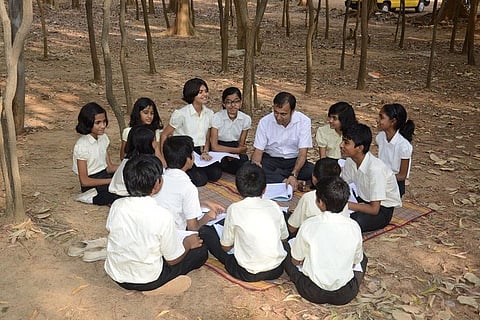

By Arghya Banerjee, Founder, The Levelfield School
We Indians are curiously contradictory: We want our children to be scientists and engineers, but, at the same time, we do not do much to nurture in them a scientific mind.
We ask them to do bow down before gods prior to exams, we make them wear astrological gems and charms to ‘improve’ their health and school performance, and we teach them to unquestioningly obey authority, be it teachers or elders.
As a society, we are crazy about ensuring our children have a career in science and engineering. But this is the same society where rationalists are killed, riots happen over religion and marriages are fixed based on the alignment of planets.
We must understand that the first step in learning science is to evaluate everything through the prism of evidence – starting with our deepest prejudices and beliefs, and, yes, also our religion.
Rather than asking our kids to memorize the laws of physics and symbols of chemistry, we should teach them to think rationally and logically. Building scientific temper in children is far more important than teaching science ‘subjects’.
In the school I run in rural Bengal, our first science lesson in Class 6 begins with a letter that celebrated evolutionary biologist Richard Dawkins wrote to his then ten-year-old daughter asking her to believe only in evidence, and not in tradition or authority.
In that letter, he traced the root of a lot of our prejudices to our childhood, by writing: “Millions of other people believe quite different things, because they were told different things when they were children. Muslim children are told different things from Christian children, and both grow up utterly convinced that they are right and the others are wrong.”
Too many people all over the world are too willing to be influenced by a passionate appeal made by religion, race and other prejudices – precisely because these beliefs are firmly put in their mind when they were impressionable children. Later, as adults, they are willing to kill for these ideas.
The world will be a better place if our children grow up to have a rational and
questioning mindset, shorn of these beliefs. And this counter-effort too must begin in the childhood: at our homes and in our classrooms.
In this, we can again learn from another father who wrote letters to his daughter.
Jawaharlal Nehru, in his letters to Indira during her childhood, talked about how religion came from our fear, and our inability to understand the world based on our limited knowledge. Like him, as teachers and parents, we too must explain to our children how religion originated, and, why in the current world, it cannot dictate all our actions.
We should also talk to them about how our skin-colour is not a determinant of our superiority or inferiority, but a reflection of the climate in which we have evolved. We should show them the ridiculous caste-based matrimonial ads, and talk to them about how the caste-system was a tool for maintaining a cruel hierarchy of power.
In a society which goes crazy over babas and charlatans every once in a while, it is also important to talk to our children about people who claim to know our future and can perform miracles. We should tell our children that our lives are determined by a complicated interplay of our genes, environment and circumstances – and it is so complex and random that no astrologer can ever predict the future and no miracle worker can magically transform it.
These topics may seem a little too grown-up for teachers to discuss with children – but they are not. Contrary to our belief, children do not need a sanitized ‘kid-friendly’ version of the world. They are more eager to listen to rational explanations than fairy tales.
Building a scientific mindset is not the only way to eliminate prejudice and hate. Rationality can also come in through the back door – through empathy.
If we feel empathetic towards the ‘other’ we start questioning what was it about them that made us hate them so much in the first place. That may prompt us to examine our deep-rooted beliefs, leading to a scientific mindset.
The correct sort of movies can be effective tools to build empathy. Great literature can also help. Maybe we should expose our children to such movies and literature in our classrooms. That might go a long way in countering bigotry and hatred, leading to a rational mind.
We can also show them movies like The Pianist to make them understand how racial prejudices, taken to its extreme absurd conclusion, can ruin everyone. Maybe we can show them Hotel Rwanda to show how rulers pitted Hutus and Tutsis, similar people with shared history, against each other for their own selfish interest. Maybe we can make our children read Rohinton Mistry’s ‘A Fine Balance’ to understand the plight of untouchables.
Instead of obsessing over their scores in the science subjects, we should first try to build scientific temper in our children. Only then we can build a kinder world, which is less prejudiced, less bigoted and less violent.